Entrepreneurship and Small Business Management
VerifiedAdded on 2023/06/15
|17
|4376
|376
AI Summary
This report focuses on entrepreneurship and small business management, discussing the definition of entrepreneurial activity and social economy, differences between serial entrepreneurs, entrepreneurs and owner managers, characteristics of micro and small size organizations and economy, the impact of small and micro businesses on the economy, and the reasons why small organizations and start-ups play a significant role in the social economy. The report also covers the main sources of generating business and entrepreneurial ideas, and how business organizations can protect their intellectual property rights. The subject is relevant to courses in entrepreneurship, small business management, and business strategy, and is applicable to various colleges and universities.
Contribute Materials
Your contribution can guide someone’s learning journey. Share your
documents today.

Entrepreneurship and
Small Business
Management
Small Business
Management
Secure Best Marks with AI Grader
Need help grading? Try our AI Grader for instant feedback on your assignments.

Contents
INTRODUCTION...........................................................................................................................................3
PART 1.........................................................................................................................................................4
MAIN BODY..................................................................................................................................................4
Define what is meant by entrepreneurial activity and social economy ..................................................4
Identify and explain 3 differences between serial entrepreneurs, entrepreneurs and owner managers 5
Explain two characteristics features of each of the following: Micro and Small size organizations and
economy..................................................................................................................................................6
Examine the relationship between Life style and Growth firms on one hand and micro and medium
size firm on the other..............................................................................................................................7
Produce and interpret a current data that shows the impact of Small and Micro business on the
economy..................................................................................................................................................8
Explain two reasons it is believed that small organizations and start-ups play significant role in social
economy..................................................................................................................................................8
The main sources of generating business and entrepreneurial ideas...................................................11
How the business organizations protect intellectual property rights....................................................11
Description of small firms and their contribution to different levels of economy.................................12
The way international differences impact upon business start-up........................................................13
Characteristics and traits of entrepreneurs and small business owners................................................13
Skills of entrepreneur and differentiate them with managers...............................................................13
The different situational factors that are considered by entrepreneurs (lifestyle, cultural difference
and motivation).....................................................................................................................................14
Various types of environments that foster or hinder entrepreneurship...............................................14
Factors that impacts business startup (personal background, education, economic traits)..................14
Risk and rewards associated with new business....................................................................................15
CONCLUSION.............................................................................................................................................16
REFERENCES..............................................................................................................................................17
INTRODUCTION...........................................................................................................................................3
PART 1.........................................................................................................................................................4
MAIN BODY..................................................................................................................................................4
Define what is meant by entrepreneurial activity and social economy ..................................................4
Identify and explain 3 differences between serial entrepreneurs, entrepreneurs and owner managers 5
Explain two characteristics features of each of the following: Micro and Small size organizations and
economy..................................................................................................................................................6
Examine the relationship between Life style and Growth firms on one hand and micro and medium
size firm on the other..............................................................................................................................7
Produce and interpret a current data that shows the impact of Small and Micro business on the
economy..................................................................................................................................................8
Explain two reasons it is believed that small organizations and start-ups play significant role in social
economy..................................................................................................................................................8
The main sources of generating business and entrepreneurial ideas...................................................11
How the business organizations protect intellectual property rights....................................................11
Description of small firms and their contribution to different levels of economy.................................12
The way international differences impact upon business start-up........................................................13
Characteristics and traits of entrepreneurs and small business owners................................................13
Skills of entrepreneur and differentiate them with managers...............................................................13
The different situational factors that are considered by entrepreneurs (lifestyle, cultural difference
and motivation).....................................................................................................................................14
Various types of environments that foster or hinder entrepreneurship...............................................14
Factors that impacts business startup (personal background, education, economic traits)..................14
Risk and rewards associated with new business....................................................................................15
CONCLUSION.............................................................................................................................................16
REFERENCES..............................................................................................................................................17
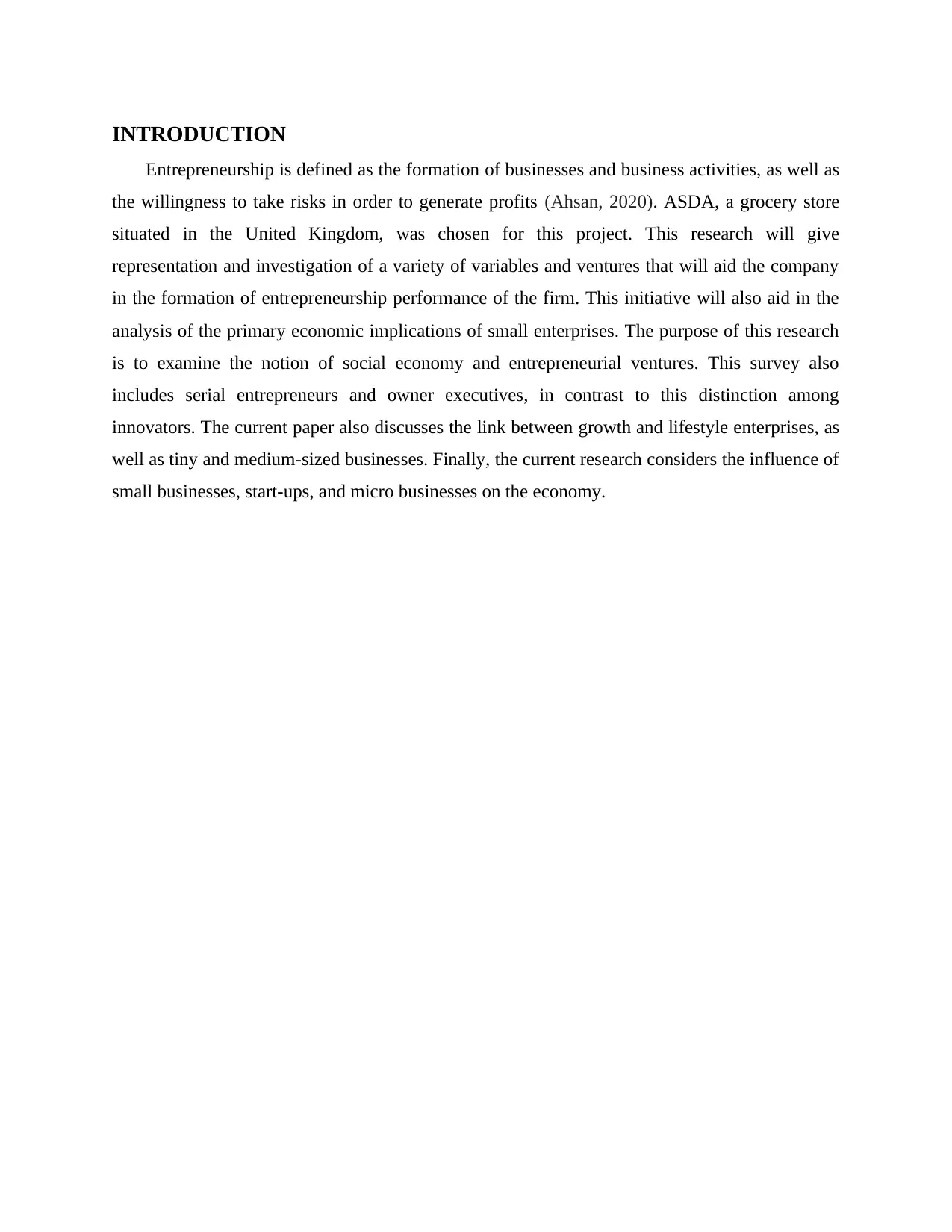
INTRODUCTION
Entrepreneurship is defined as the formation of businesses and business activities, as well as
the willingness to take risks in order to generate profits (Ahsan, 2020). ASDA, a grocery store
situated in the United Kingdom, was chosen for this project. This research will give
representation and investigation of a variety of variables and ventures that will aid the company
in the formation of entrepreneurship performance of the firm. This initiative will also aid in the
analysis of the primary economic implications of small enterprises. The purpose of this research
is to examine the notion of social economy and entrepreneurial ventures. This survey also
includes serial entrepreneurs and owner executives, in contrast to this distinction among
innovators. The current paper also discusses the link between growth and lifestyle enterprises, as
well as tiny and medium-sized businesses. Finally, the current research considers the influence of
small businesses, start-ups, and micro businesses on the economy.
Entrepreneurship is defined as the formation of businesses and business activities, as well as
the willingness to take risks in order to generate profits (Ahsan, 2020). ASDA, a grocery store
situated in the United Kingdom, was chosen for this project. This research will give
representation and investigation of a variety of variables and ventures that will aid the company
in the formation of entrepreneurship performance of the firm. This initiative will also aid in the
analysis of the primary economic implications of small enterprises. The purpose of this research
is to examine the notion of social economy and entrepreneurial ventures. This survey also
includes serial entrepreneurs and owner executives, in contrast to this distinction among
innovators. The current paper also discusses the link between growth and lifestyle enterprises, as
well as tiny and medium-sized businesses. Finally, the current research considers the influence of
small businesses, start-ups, and micro businesses on the economy.
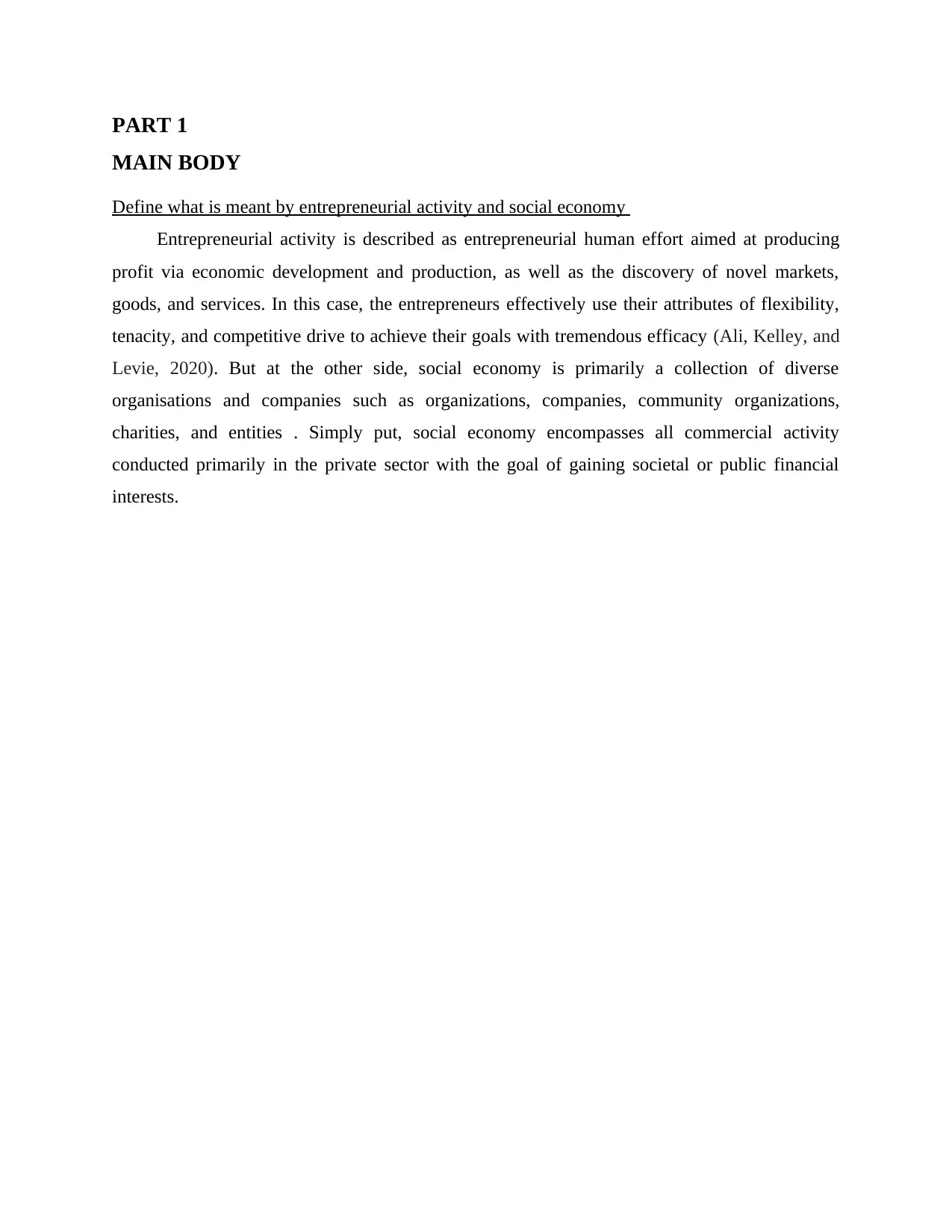
PART 1
MAIN BODY
Define what is meant by entrepreneurial activity and social economy
Entrepreneurial activity is described as entrepreneurial human effort aimed at producing
profit via economic development and production, as well as the discovery of novel markets,
goods, and services. In this case, the entrepreneurs effectively use their attributes of flexibility,
tenacity, and competitive drive to achieve their goals with tremendous efficacy (Ali, Kelley, and
Levie, 2020). But at the other side, social economy is primarily a collection of diverse
organisations and companies such as organizations, companies, community organizations,
charities, and entities . Simply put, social economy encompasses all commercial activity
conducted primarily in the private sector with the goal of gaining societal or public financial
interests.
MAIN BODY
Define what is meant by entrepreneurial activity and social economy
Entrepreneurial activity is described as entrepreneurial human effort aimed at producing
profit via economic development and production, as well as the discovery of novel markets,
goods, and services. In this case, the entrepreneurs effectively use their attributes of flexibility,
tenacity, and competitive drive to achieve their goals with tremendous efficacy (Ali, Kelley, and
Levie, 2020). But at the other side, social economy is primarily a collection of diverse
organisations and companies such as organizations, companies, community organizations,
charities, and entities . Simply put, social economy encompasses all commercial activity
conducted primarily in the private sector with the goal of gaining societal or public financial
interests.
Secure Best Marks with AI Grader
Need help grading? Try our AI Grader for instant feedback on your assignments.
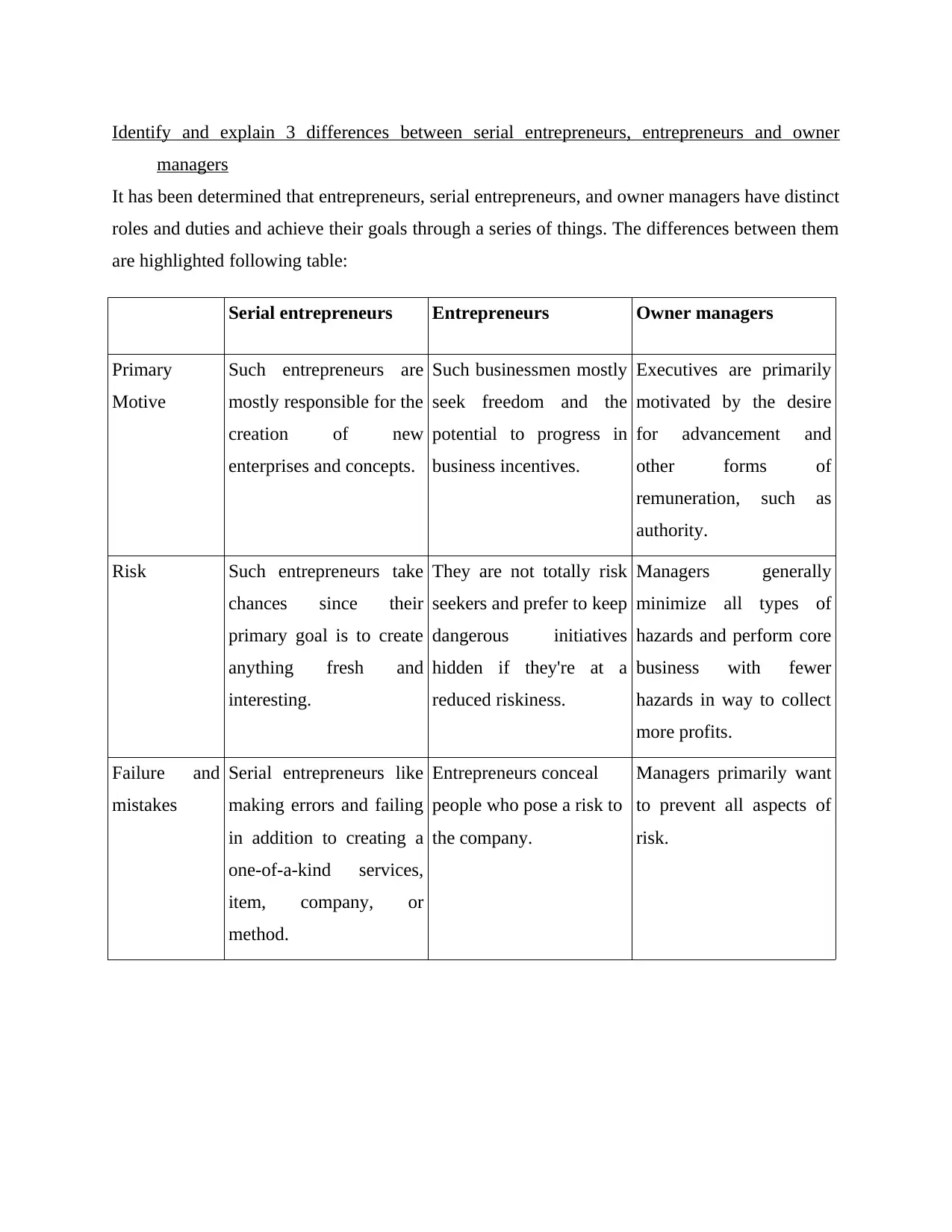
Identify and explain 3 differences between serial entrepreneurs, entrepreneurs and owner
managers
It has been determined that entrepreneurs, serial entrepreneurs, and owner managers have distinct
roles and duties and achieve their goals through a series of things. The differences between them
are highlighted following table:
Serial entrepreneurs Entrepreneurs Owner managers
Primary
Motive
Such entrepreneurs are
mostly responsible for the
creation of new
enterprises and concepts.
Such businessmen mostly
seek freedom and the
potential to progress in
business incentives.
Executives are primarily
motivated by the desire
for advancement and
other forms of
remuneration, such as
authority.
Risk Such entrepreneurs take
chances since their
primary goal is to create
anything fresh and
interesting.
They are not totally risk
seekers and prefer to keep
dangerous initiatives
hidden if they're at a
reduced riskiness.
Managers generally
minimize all types of
hazards and perform core
business with fewer
hazards in way to collect
more profits.
Failure and
mistakes
Serial entrepreneurs like
making errors and failing
in addition to creating a
one-of-a-kind services,
item, company, or
method.
Entrepreneurs conceal
people who pose a risk to
the company.
Managers primarily want
to prevent all aspects of
risk.
managers
It has been determined that entrepreneurs, serial entrepreneurs, and owner managers have distinct
roles and duties and achieve their goals through a series of things. The differences between them
are highlighted following table:
Serial entrepreneurs Entrepreneurs Owner managers
Primary
Motive
Such entrepreneurs are
mostly responsible for the
creation of new
enterprises and concepts.
Such businessmen mostly
seek freedom and the
potential to progress in
business incentives.
Executives are primarily
motivated by the desire
for advancement and
other forms of
remuneration, such as
authority.
Risk Such entrepreneurs take
chances since their
primary goal is to create
anything fresh and
interesting.
They are not totally risk
seekers and prefer to keep
dangerous initiatives
hidden if they're at a
reduced riskiness.
Managers generally
minimize all types of
hazards and perform core
business with fewer
hazards in way to collect
more profits.
Failure and
mistakes
Serial entrepreneurs like
making errors and failing
in addition to creating a
one-of-a-kind services,
item, company, or
method.
Entrepreneurs conceal
people who pose a risk to
the company.
Managers primarily want
to prevent all aspects of
risk.
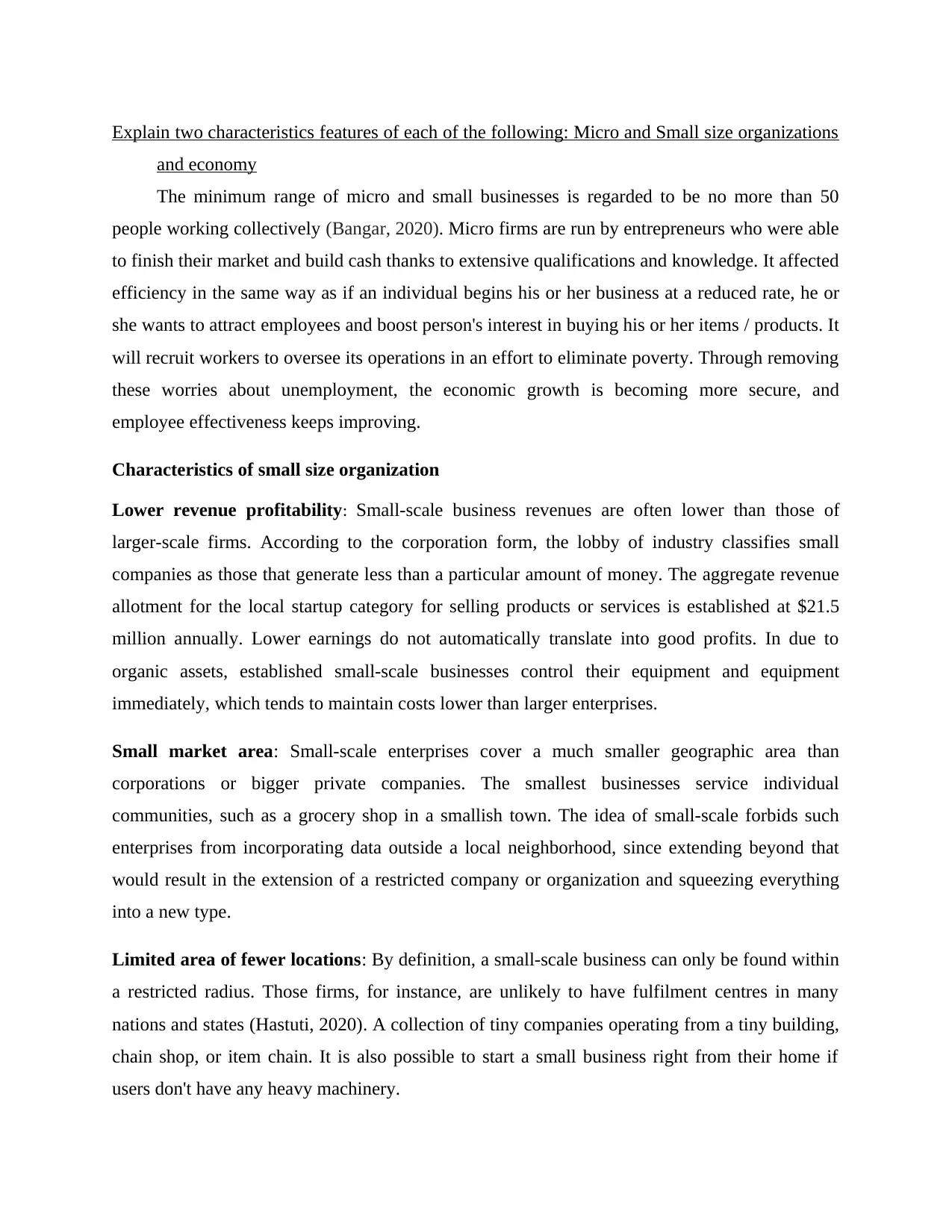
Explain two characteristics features of each of the following: Micro and Small size organizations
and economy
The minimum range of micro and small businesses is regarded to be no more than 50
people working collectively (Bangar, 2020). Micro firms are run by entrepreneurs who were able
to finish their market and build cash thanks to extensive qualifications and knowledge. It affected
efficiency in the same way as if an individual begins his or her business at a reduced rate, he or
she wants to attract employees and boost person's interest in buying his or her items / products. It
will recruit workers to oversee its operations in an effort to eliminate poverty. Through removing
these worries about unemployment, the economic growth is becoming more secure, and
employee effectiveness keeps improving.
Characteristics of small size organization
Lower revenue profitability: Small-scale business revenues are often lower than those of
larger-scale firms. According to the corporation form, the lobby of industry classifies small
companies as those that generate less than a particular amount of money. The aggregate revenue
allotment for the local startup category for selling products or services is established at $21.5
million annually. Lower earnings do not automatically translate into good profits. In due to
organic assets, established small-scale businesses control their equipment and equipment
immediately, which tends to maintain costs lower than larger enterprises.
Small market area: Small-scale enterprises cover a much smaller geographic area than
corporations or bigger private companies. The smallest businesses service individual
communities, such as a grocery shop in a smallish town. The idea of small-scale forbids such
enterprises from incorporating data outside a local neighborhood, since extending beyond that
would result in the extension of a restricted company or organization and squeezing everything
into a new type.
Limited area of fewer locations: By definition, a small-scale business can only be found within
a restricted radius. Those firms, for instance, are unlikely to have fulfilment centres in many
nations and states (Hastuti, 2020). A collection of tiny companies operating from a tiny building,
chain shop, or item chain. It is also possible to start a small business right from their home if
users don't have any heavy machinery.
and economy
The minimum range of micro and small businesses is regarded to be no more than 50
people working collectively (Bangar, 2020). Micro firms are run by entrepreneurs who were able
to finish their market and build cash thanks to extensive qualifications and knowledge. It affected
efficiency in the same way as if an individual begins his or her business at a reduced rate, he or
she wants to attract employees and boost person's interest in buying his or her items / products. It
will recruit workers to oversee its operations in an effort to eliminate poverty. Through removing
these worries about unemployment, the economic growth is becoming more secure, and
employee effectiveness keeps improving.
Characteristics of small size organization
Lower revenue profitability: Small-scale business revenues are often lower than those of
larger-scale firms. According to the corporation form, the lobby of industry classifies small
companies as those that generate less than a particular amount of money. The aggregate revenue
allotment for the local startup category for selling products or services is established at $21.5
million annually. Lower earnings do not automatically translate into good profits. In due to
organic assets, established small-scale businesses control their equipment and equipment
immediately, which tends to maintain costs lower than larger enterprises.
Small market area: Small-scale enterprises cover a much smaller geographic area than
corporations or bigger private companies. The smallest businesses service individual
communities, such as a grocery shop in a smallish town. The idea of small-scale forbids such
enterprises from incorporating data outside a local neighborhood, since extending beyond that
would result in the extension of a restricted company or organization and squeezing everything
into a new type.
Limited area of fewer locations: By definition, a small-scale business can only be found within
a restricted radius. Those firms, for instance, are unlikely to have fulfilment centres in many
nations and states (Hastuti, 2020). A collection of tiny companies operating from a tiny building,
chain shop, or item chain. It is also possible to start a small business right from their home if
users don't have any heavy machinery.
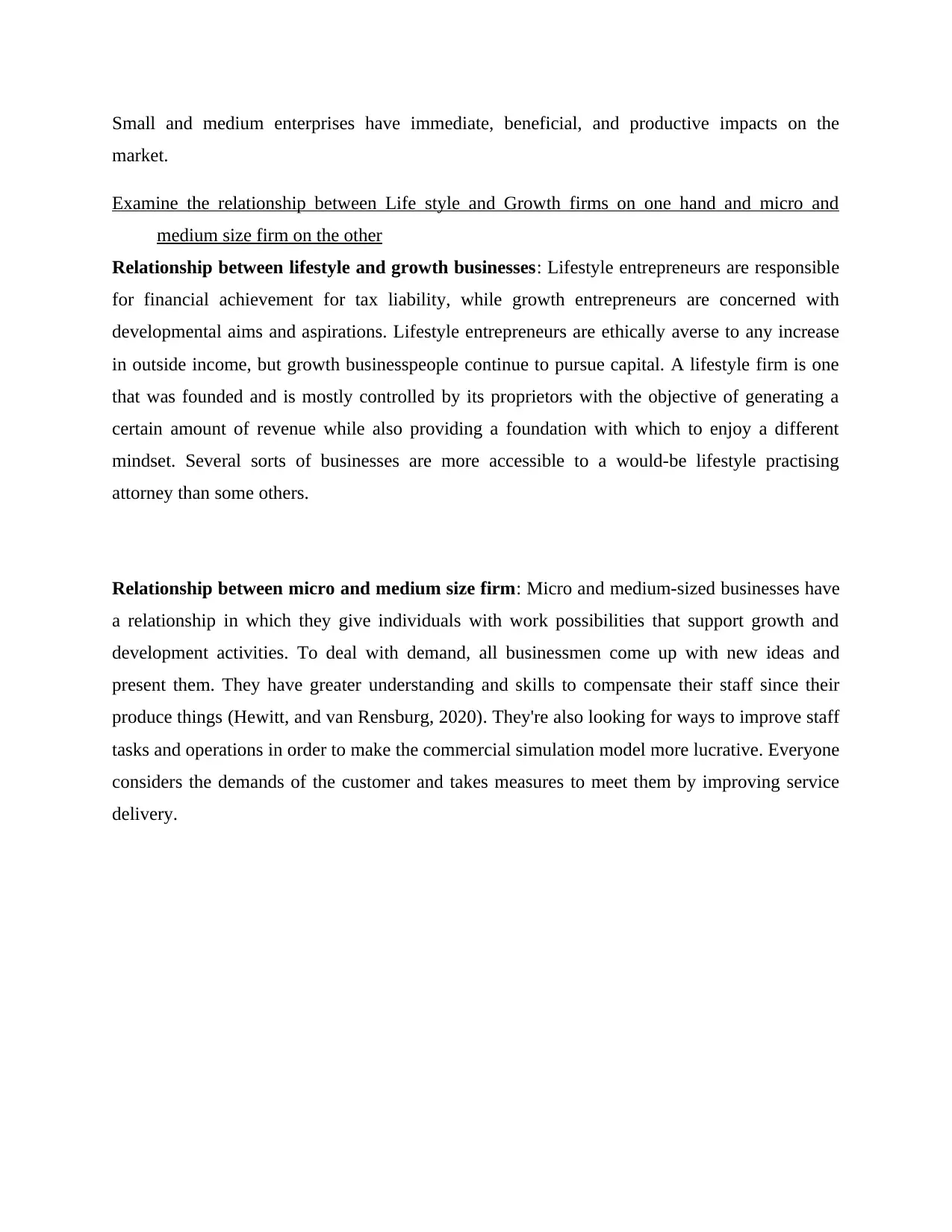
Small and medium enterprises have immediate, beneficial, and productive impacts on the
market.
Examine the relationship between Life style and Growth firms on one hand and micro and
medium size firm on the other
Relationship between lifestyle and growth businesses: Lifestyle entrepreneurs are responsible
for financial achievement for tax liability, while growth entrepreneurs are concerned with
developmental aims and aspirations. Lifestyle entrepreneurs are ethically averse to any increase
in outside income, but growth businesspeople continue to pursue capital. A lifestyle firm is one
that was founded and is mostly controlled by its proprietors with the objective of generating a
certain amount of revenue while also providing a foundation with which to enjoy a different
mindset. Several sorts of businesses are more accessible to a would-be lifestyle practising
attorney than some others.
Relationship between micro and medium size firm: Micro and medium-sized businesses have
a relationship in which they give individuals with work possibilities that support growth and
development activities. To deal with demand, all businessmen come up with new ideas and
present them. They have greater understanding and skills to compensate their staff since their
produce things (Hewitt, and van Rensburg, 2020). They're also looking for ways to improve staff
tasks and operations in order to make the commercial simulation model more lucrative. Everyone
considers the demands of the customer and takes measures to meet them by improving service
delivery.
market.
Examine the relationship between Life style and Growth firms on one hand and micro and
medium size firm on the other
Relationship between lifestyle and growth businesses: Lifestyle entrepreneurs are responsible
for financial achievement for tax liability, while growth entrepreneurs are concerned with
developmental aims and aspirations. Lifestyle entrepreneurs are ethically averse to any increase
in outside income, but growth businesspeople continue to pursue capital. A lifestyle firm is one
that was founded and is mostly controlled by its proprietors with the objective of generating a
certain amount of revenue while also providing a foundation with which to enjoy a different
mindset. Several sorts of businesses are more accessible to a would-be lifestyle practising
attorney than some others.
Relationship between micro and medium size firm: Micro and medium-sized businesses have
a relationship in which they give individuals with work possibilities that support growth and
development activities. To deal with demand, all businessmen come up with new ideas and
present them. They have greater understanding and skills to compensate their staff since their
produce things (Hewitt, and van Rensburg, 2020). They're also looking for ways to improve staff
tasks and operations in order to make the commercial simulation model more lucrative. Everyone
considers the demands of the customer and takes measures to meet them by improving service
delivery.
Paraphrase This Document
Need a fresh take? Get an instant paraphrase of this document with our AI Paraphraser
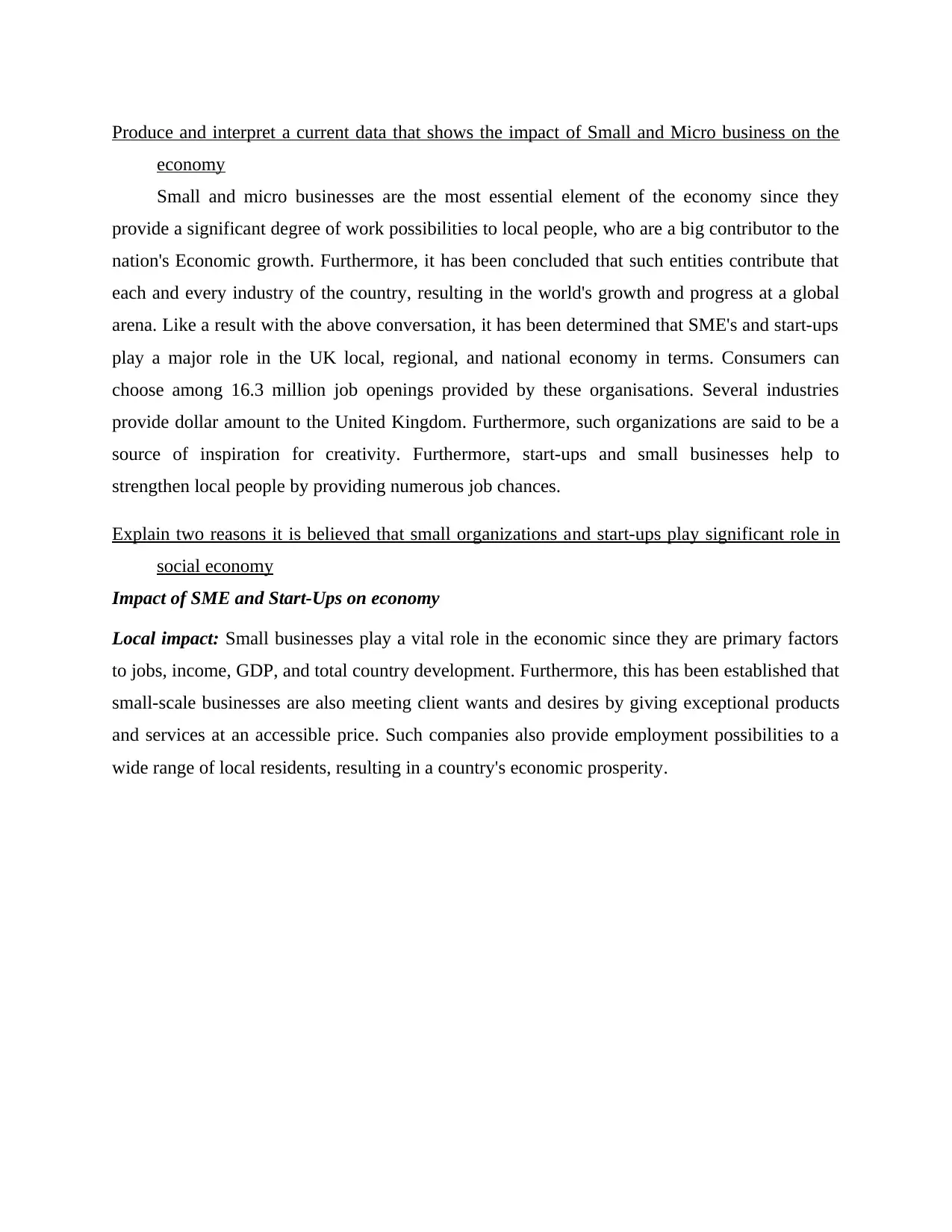
Produce and interpret a current data that shows the impact of Small and Micro business on the
economy
Small and micro businesses are the most essential element of the economy since they
provide a significant degree of work possibilities to local people, who are a big contributor to the
nation's Economic growth. Furthermore, it has been concluded that such entities contribute that
each and every industry of the country, resulting in the world's growth and progress at a global
arena. Like a result with the above conversation, it has been determined that SME's and start-ups
play a major role in the UK local, regional, and national economy in terms. Consumers can
choose among 16.3 million job openings provided by these organisations. Several industries
provide dollar amount to the United Kingdom. Furthermore, such organizations are said to be a
source of inspiration for creativity. Furthermore, start-ups and small businesses help to
strengthen local people by providing numerous job chances.
Explain two reasons it is believed that small organizations and start-ups play significant role in
social economy
Impact of SME and Start-Ups on economy
Local impact: Small businesses play a vital role in the economic since they are primary factors
to jobs, income, GDP, and total country development. Furthermore, this has been established that
small-scale businesses are also meeting client wants and desires by giving exceptional products
and services at an accessible price. Such companies also provide employment possibilities to a
wide range of local residents, resulting in a country's economic prosperity.
economy
Small and micro businesses are the most essential element of the economy since they
provide a significant degree of work possibilities to local people, who are a big contributor to the
nation's Economic growth. Furthermore, it has been concluded that such entities contribute that
each and every industry of the country, resulting in the world's growth and progress at a global
arena. Like a result with the above conversation, it has been determined that SME's and start-ups
play a major role in the UK local, regional, and national economy in terms. Consumers can
choose among 16.3 million job openings provided by these organisations. Several industries
provide dollar amount to the United Kingdom. Furthermore, such organizations are said to be a
source of inspiration for creativity. Furthermore, start-ups and small businesses help to
strengthen local people by providing numerous job chances.
Explain two reasons it is believed that small organizations and start-ups play significant role in
social economy
Impact of SME and Start-Ups on economy
Local impact: Small businesses play a vital role in the economic since they are primary factors
to jobs, income, GDP, and total country development. Furthermore, this has been established that
small-scale businesses are also meeting client wants and desires by giving exceptional products
and services at an accessible price. Such companies also provide employment possibilities to a
wide range of local residents, resulting in a country's economic prosperity.
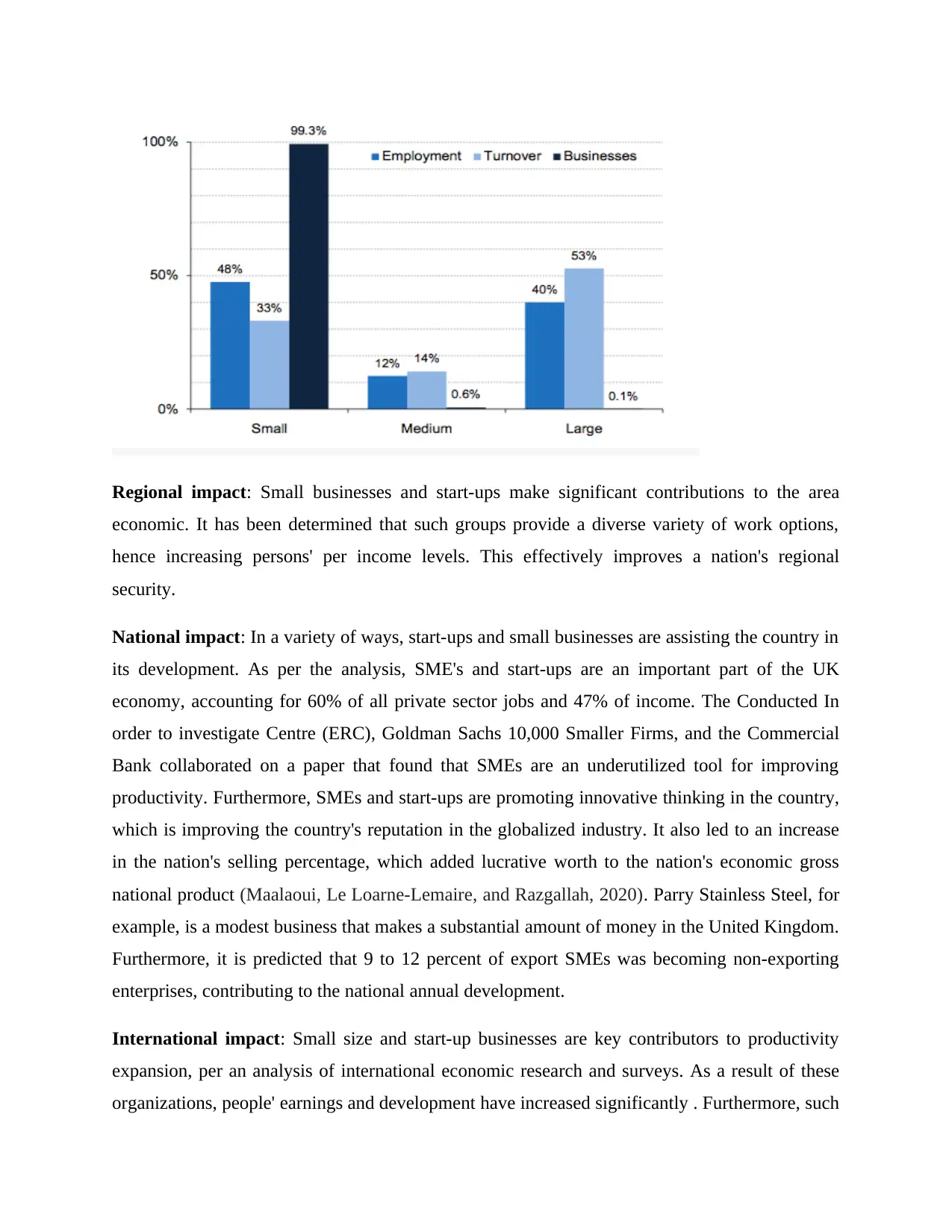
Regional impact: Small businesses and start-ups make significant contributions to the area
economic. It has been determined that such groups provide a diverse variety of work options,
hence increasing persons' per income levels. This effectively improves a nation's regional
security.
National impact: In a variety of ways, start-ups and small businesses are assisting the country in
its development. As per the analysis, SME's and start-ups are an important part of the UK
economy, accounting for 60% of all private sector jobs and 47% of income. The Conducted In
order to investigate Centre (ERC), Goldman Sachs 10,000 Smaller Firms, and the Commercial
Bank collaborated on a paper that found that SMEs are an underutilized tool for improving
productivity. Furthermore, SMEs and start-ups are promoting innovative thinking in the country,
which is improving the country's reputation in the globalized industry. It also led to an increase
in the nation's selling percentage, which added lucrative worth to the nation's economic gross
national product (Maalaoui, Le Loarne-Lemaire, and Razgallah, 2020). Parry Stainless Steel, for
example, is a modest business that makes a substantial amount of money in the United Kingdom.
Furthermore, it is predicted that 9 to 12 percent of export SMEs was becoming non-exporting
enterprises, contributing to the national annual development.
International impact: Small size and start-up businesses are key contributors to productivity
expansion, per an analysis of international economic research and surveys. As a result of these
organizations, people' earnings and development have increased significantly . Furthermore, such
economic. It has been determined that such groups provide a diverse variety of work options,
hence increasing persons' per income levels. This effectively improves a nation's regional
security.
National impact: In a variety of ways, start-ups and small businesses are assisting the country in
its development. As per the analysis, SME's and start-ups are an important part of the UK
economy, accounting for 60% of all private sector jobs and 47% of income. The Conducted In
order to investigate Centre (ERC), Goldman Sachs 10,000 Smaller Firms, and the Commercial
Bank collaborated on a paper that found that SMEs are an underutilized tool for improving
productivity. Furthermore, SMEs and start-ups are promoting innovative thinking in the country,
which is improving the country's reputation in the globalized industry. It also led to an increase
in the nation's selling percentage, which added lucrative worth to the nation's economic gross
national product (Maalaoui, Le Loarne-Lemaire, and Razgallah, 2020). Parry Stainless Steel, for
example, is a modest business that makes a substantial amount of money in the United Kingdom.
Furthermore, it is predicted that 9 to 12 percent of export SMEs was becoming non-exporting
enterprises, contributing to the national annual development.
International impact: Small size and start-up businesses are key contributors to productivity
expansion, per an analysis of international economic research and surveys. As a result of these
organizations, people' earnings and development have increased significantly . Furthermore, such
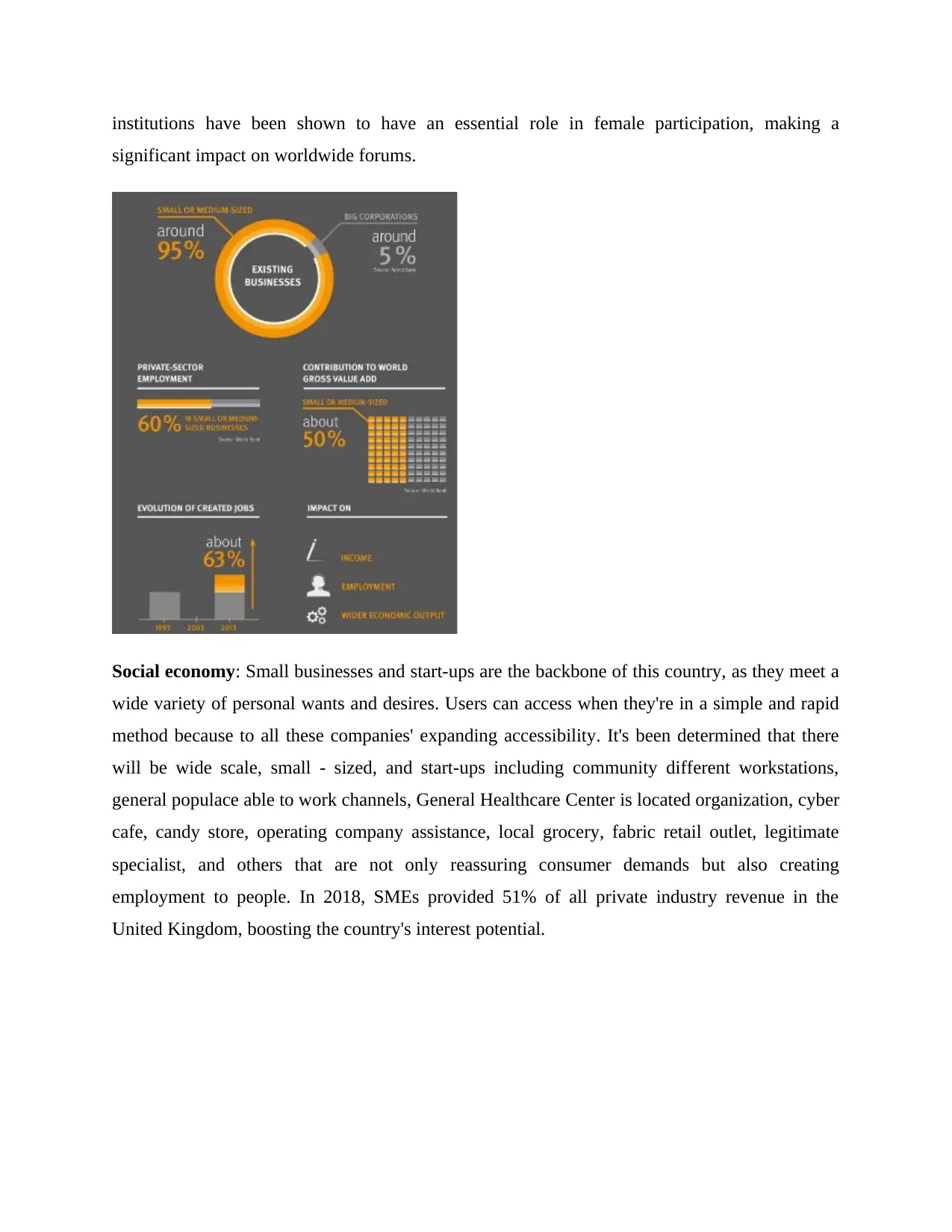
institutions have been shown to have an essential role in female participation, making a
significant impact on worldwide forums.
Social economy: Small businesses and start-ups are the backbone of this country, as they meet a
wide variety of personal wants and desires. Users can access when they're in a simple and rapid
method because to all these companies' expanding accessibility. It's been determined that there
will be wide scale, small - sized, and start-ups including community different workstations,
general populace able to work channels, General Healthcare Center is located organization, cyber
cafe, candy store, operating company assistance, local grocery, fabric retail outlet, legitimate
specialist, and others that are not only reassuring consumer demands but also creating
employment to people. In 2018, SMEs provided 51% of all private industry revenue in the
United Kingdom, boosting the country's interest potential.
significant impact on worldwide forums.
Social economy: Small businesses and start-ups are the backbone of this country, as they meet a
wide variety of personal wants and desires. Users can access when they're in a simple and rapid
method because to all these companies' expanding accessibility. It's been determined that there
will be wide scale, small - sized, and start-ups including community different workstations,
general populace able to work channels, General Healthcare Center is located organization, cyber
cafe, candy store, operating company assistance, local grocery, fabric retail outlet, legitimate
specialist, and others that are not only reassuring consumer demands but also creating
employment to people. In 2018, SMEs provided 51% of all private industry revenue in the
United Kingdom, boosting the country's interest potential.
Secure Best Marks with AI Grader
Need help grading? Try our AI Grader for instant feedback on your assignments.
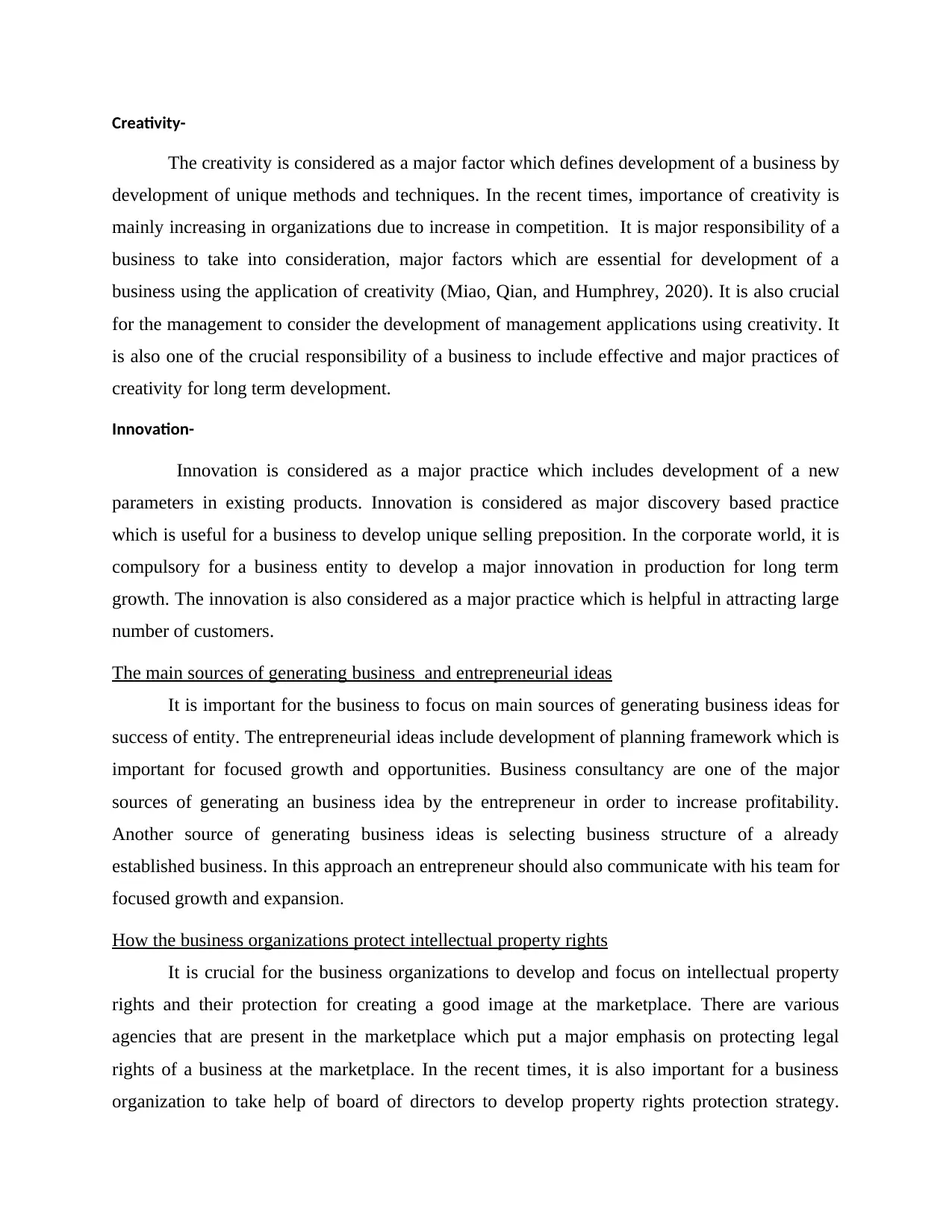
Creativity-
The creativity is considered as a major factor which defines development of a business by
development of unique methods and techniques. In the recent times, importance of creativity is
mainly increasing in organizations due to increase in competition. It is major responsibility of a
business to take into consideration, major factors which are essential for development of a
business using the application of creativity (Miao, Qian, and Humphrey, 2020). It is also crucial
for the management to consider the development of management applications using creativity. It
is also one of the crucial responsibility of a business to include effective and major practices of
creativity for long term development.
Innovation-
Innovation is considered as a major practice which includes development of a new
parameters in existing products. Innovation is considered as major discovery based practice
which is useful for a business to develop unique selling preposition. In the corporate world, it is
compulsory for a business entity to develop a major innovation in production for long term
growth. The innovation is also considered as a major practice which is helpful in attracting large
number of customers.
The main sources of generating business and entrepreneurial ideas
It is important for the business to focus on main sources of generating business ideas for
success of entity. The entrepreneurial ideas include development of planning framework which is
important for focused growth and opportunities. Business consultancy are one of the major
sources of generating an business idea by the entrepreneur in order to increase profitability.
Another source of generating business ideas is selecting business structure of a already
established business. In this approach an entrepreneur should also communicate with his team for
focused growth and expansion.
How the business organizations protect intellectual property rights
It is crucial for the business organizations to develop and focus on intellectual property
rights and their protection for creating a good image at the marketplace. There are various
agencies that are present in the marketplace which put a major emphasis on protecting legal
rights of a business at the marketplace. In the recent times, it is also important for a business
organization to take help of board of directors to develop property rights protection strategy.
The creativity is considered as a major factor which defines development of a business by
development of unique methods and techniques. In the recent times, importance of creativity is
mainly increasing in organizations due to increase in competition. It is major responsibility of a
business to take into consideration, major factors which are essential for development of a
business using the application of creativity (Miao, Qian, and Humphrey, 2020). It is also crucial
for the management to consider the development of management applications using creativity. It
is also one of the crucial responsibility of a business to include effective and major practices of
creativity for long term development.
Innovation-
Innovation is considered as a major practice which includes development of a new
parameters in existing products. Innovation is considered as major discovery based practice
which is useful for a business to develop unique selling preposition. In the corporate world, it is
compulsory for a business entity to develop a major innovation in production for long term
growth. The innovation is also considered as a major practice which is helpful in attracting large
number of customers.
The main sources of generating business and entrepreneurial ideas
It is important for the business to focus on main sources of generating business ideas for
success of entity. The entrepreneurial ideas include development of planning framework which is
important for focused growth and opportunities. Business consultancy are one of the major
sources of generating an business idea by the entrepreneur in order to increase profitability.
Another source of generating business ideas is selecting business structure of a already
established business. In this approach an entrepreneur should also communicate with his team for
focused growth and expansion.
How the business organizations protect intellectual property rights
It is crucial for the business organizations to develop and focus on intellectual property
rights and their protection for creating a good image at the marketplace. There are various
agencies that are present in the marketplace which put a major emphasis on protecting legal
rights of a business at the marketplace. In the recent times, it is also important for a business
organization to take help of board of directors to develop property rights protection strategy.
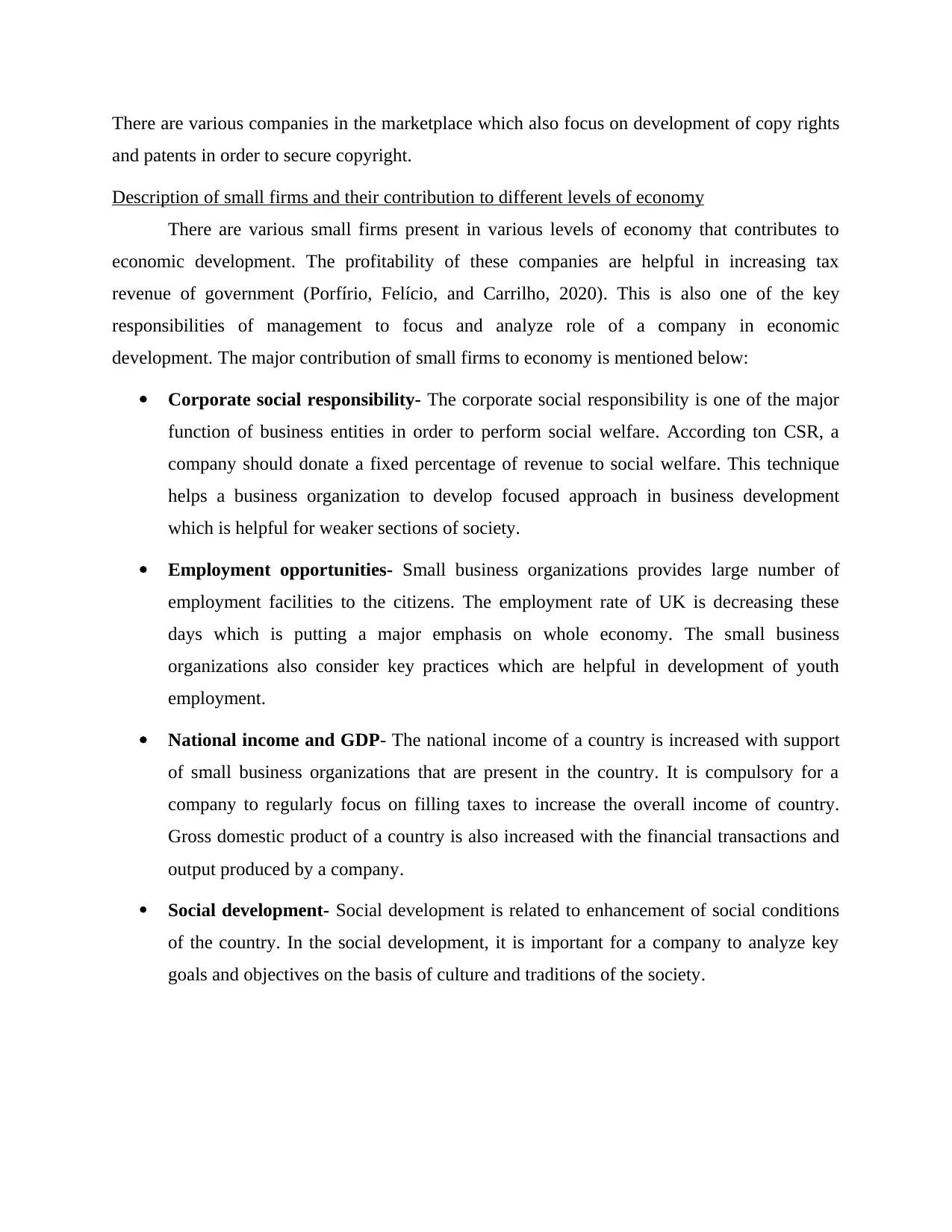
There are various companies in the marketplace which also focus on development of copy rights
and patents in order to secure copyright.
Description of small firms and their contribution to different levels of economy
There are various small firms present in various levels of economy that contributes to
economic development. The profitability of these companies are helpful in increasing tax
revenue of government (Porfírio, Felício, and Carrilho, 2020). This is also one of the key
responsibilities of management to focus and analyze role of a company in economic
development. The major contribution of small firms to economy is mentioned below:
Corporate social responsibility- The corporate social responsibility is one of the major
function of business entities in order to perform social welfare. According ton CSR, a
company should donate a fixed percentage of revenue to social welfare. This technique
helps a business organization to develop focused approach in business development
which is helpful for weaker sections of society.
Employment opportunities- Small business organizations provides large number of
employment facilities to the citizens. The employment rate of UK is decreasing these
days which is putting a major emphasis on whole economy. The small business
organizations also consider key practices which are helpful in development of youth
employment.
National income and GDP- The national income of a country is increased with support
of small business organizations that are present in the country. It is compulsory for a
company to regularly focus on filling taxes to increase the overall income of country.
Gross domestic product of a country is also increased with the financial transactions and
output produced by a company.
Social development- Social development is related to enhancement of social conditions
of the country. In the social development, it is important for a company to analyze key
goals and objectives on the basis of culture and traditions of the society.
and patents in order to secure copyright.
Description of small firms and their contribution to different levels of economy
There are various small firms present in various levels of economy that contributes to
economic development. The profitability of these companies are helpful in increasing tax
revenue of government (Porfírio, Felício, and Carrilho, 2020). This is also one of the key
responsibilities of management to focus and analyze role of a company in economic
development. The major contribution of small firms to economy is mentioned below:
Corporate social responsibility- The corporate social responsibility is one of the major
function of business entities in order to perform social welfare. According ton CSR, a
company should donate a fixed percentage of revenue to social welfare. This technique
helps a business organization to develop focused approach in business development
which is helpful for weaker sections of society.
Employment opportunities- Small business organizations provides large number of
employment facilities to the citizens. The employment rate of UK is decreasing these
days which is putting a major emphasis on whole economy. The small business
organizations also consider key practices which are helpful in development of youth
employment.
National income and GDP- The national income of a country is increased with support
of small business organizations that are present in the country. It is compulsory for a
company to regularly focus on filling taxes to increase the overall income of country.
Gross domestic product of a country is also increased with the financial transactions and
output produced by a company.
Social development- Social development is related to enhancement of social conditions
of the country. In the social development, it is important for a company to analyze key
goals and objectives on the basis of culture and traditions of the society.
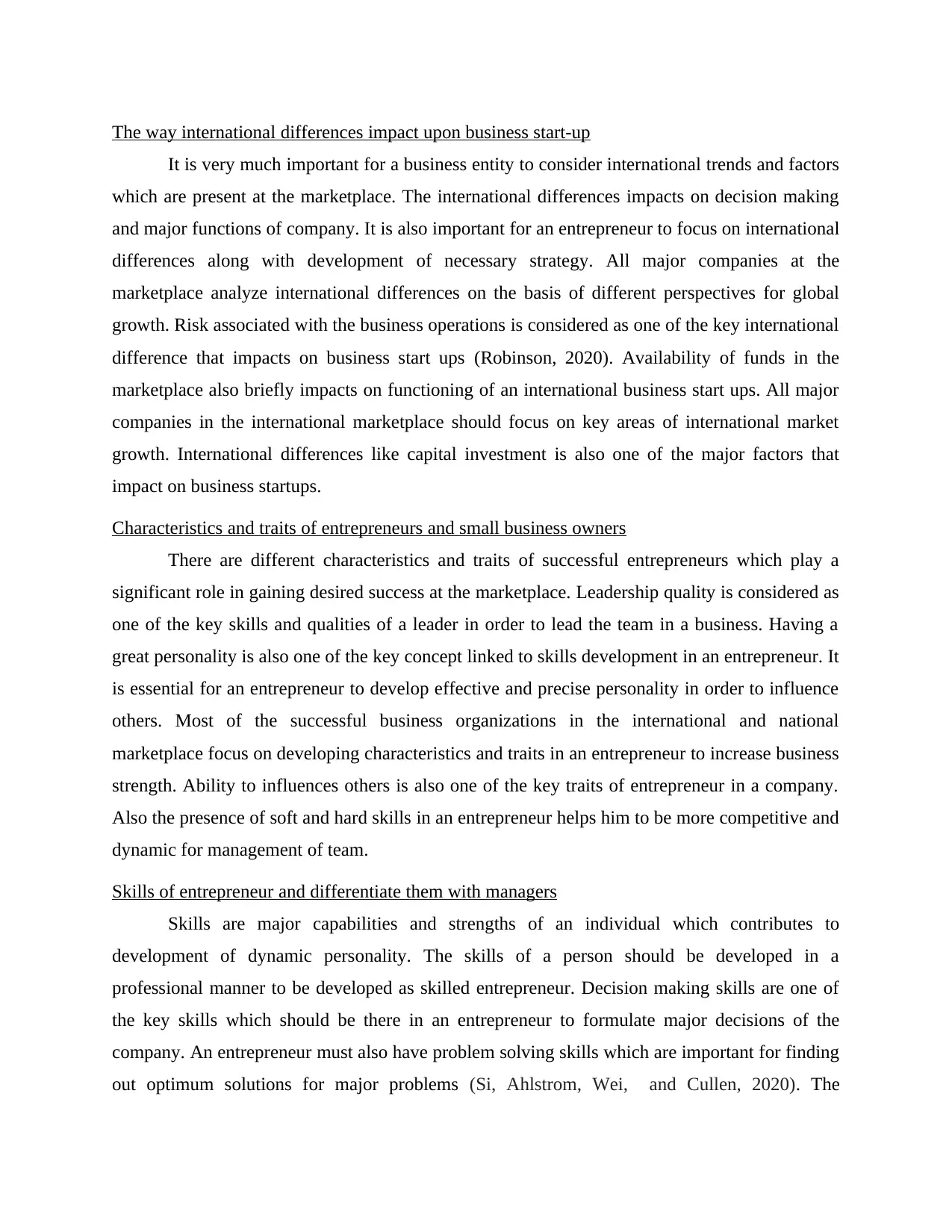
The way international differences impact upon business start-up
It is very much important for a business entity to consider international trends and factors
which are present at the marketplace. The international differences impacts on decision making
and major functions of company. It is also important for an entrepreneur to focus on international
differences along with development of necessary strategy. All major companies at the
marketplace analyze international differences on the basis of different perspectives for global
growth. Risk associated with the business operations is considered as one of the key international
difference that impacts on business start ups (Robinson, 2020). Availability of funds in the
marketplace also briefly impacts on functioning of an international business start ups. All major
companies in the international marketplace should focus on key areas of international market
growth. International differences like capital investment is also one of the major factors that
impact on business startups.
Characteristics and traits of entrepreneurs and small business owners
There are different characteristics and traits of successful entrepreneurs which play a
significant role in gaining desired success at the marketplace. Leadership quality is considered as
one of the key skills and qualities of a leader in order to lead the team in a business. Having a
great personality is also one of the key concept linked to skills development in an entrepreneur. It
is essential for an entrepreneur to develop effective and precise personality in order to influence
others. Most of the successful business organizations in the international and national
marketplace focus on developing characteristics and traits in an entrepreneur to increase business
strength. Ability to influences others is also one of the key traits of entrepreneur in a company.
Also the presence of soft and hard skills in an entrepreneur helps him to be more competitive and
dynamic for management of team.
Skills of entrepreneur and differentiate them with managers
Skills are major capabilities and strengths of an individual which contributes to
development of dynamic personality. The skills of a person should be developed in a
professional manner to be developed as skilled entrepreneur. Decision making skills are one of
the key skills which should be there in an entrepreneur to formulate major decisions of the
company. An entrepreneur must also have problem solving skills which are important for finding
out optimum solutions for major problems (Si, Ahlstrom, Wei, and Cullen, 2020). The
It is very much important for a business entity to consider international trends and factors
which are present at the marketplace. The international differences impacts on decision making
and major functions of company. It is also important for an entrepreneur to focus on international
differences along with development of necessary strategy. All major companies at the
marketplace analyze international differences on the basis of different perspectives for global
growth. Risk associated with the business operations is considered as one of the key international
difference that impacts on business start ups (Robinson, 2020). Availability of funds in the
marketplace also briefly impacts on functioning of an international business start ups. All major
companies in the international marketplace should focus on key areas of international market
growth. International differences like capital investment is also one of the major factors that
impact on business startups.
Characteristics and traits of entrepreneurs and small business owners
There are different characteristics and traits of successful entrepreneurs which play a
significant role in gaining desired success at the marketplace. Leadership quality is considered as
one of the key skills and qualities of a leader in order to lead the team in a business. Having a
great personality is also one of the key concept linked to skills development in an entrepreneur. It
is essential for an entrepreneur to develop effective and precise personality in order to influence
others. Most of the successful business organizations in the international and national
marketplace focus on developing characteristics and traits in an entrepreneur to increase business
strength. Ability to influences others is also one of the key traits of entrepreneur in a company.
Also the presence of soft and hard skills in an entrepreneur helps him to be more competitive and
dynamic for management of team.
Skills of entrepreneur and differentiate them with managers
Skills are major capabilities and strengths of an individual which contributes to
development of dynamic personality. The skills of a person should be developed in a
professional manner to be developed as skilled entrepreneur. Decision making skills are one of
the key skills which should be there in an entrepreneur to formulate major decisions of the
company. An entrepreneur must also have problem solving skills which are important for finding
out optimum solutions for major problems (Si, Ahlstrom, Wei, and Cullen, 2020). The
Paraphrase This Document
Need a fresh take? Get an instant paraphrase of this document with our AI Paraphraser
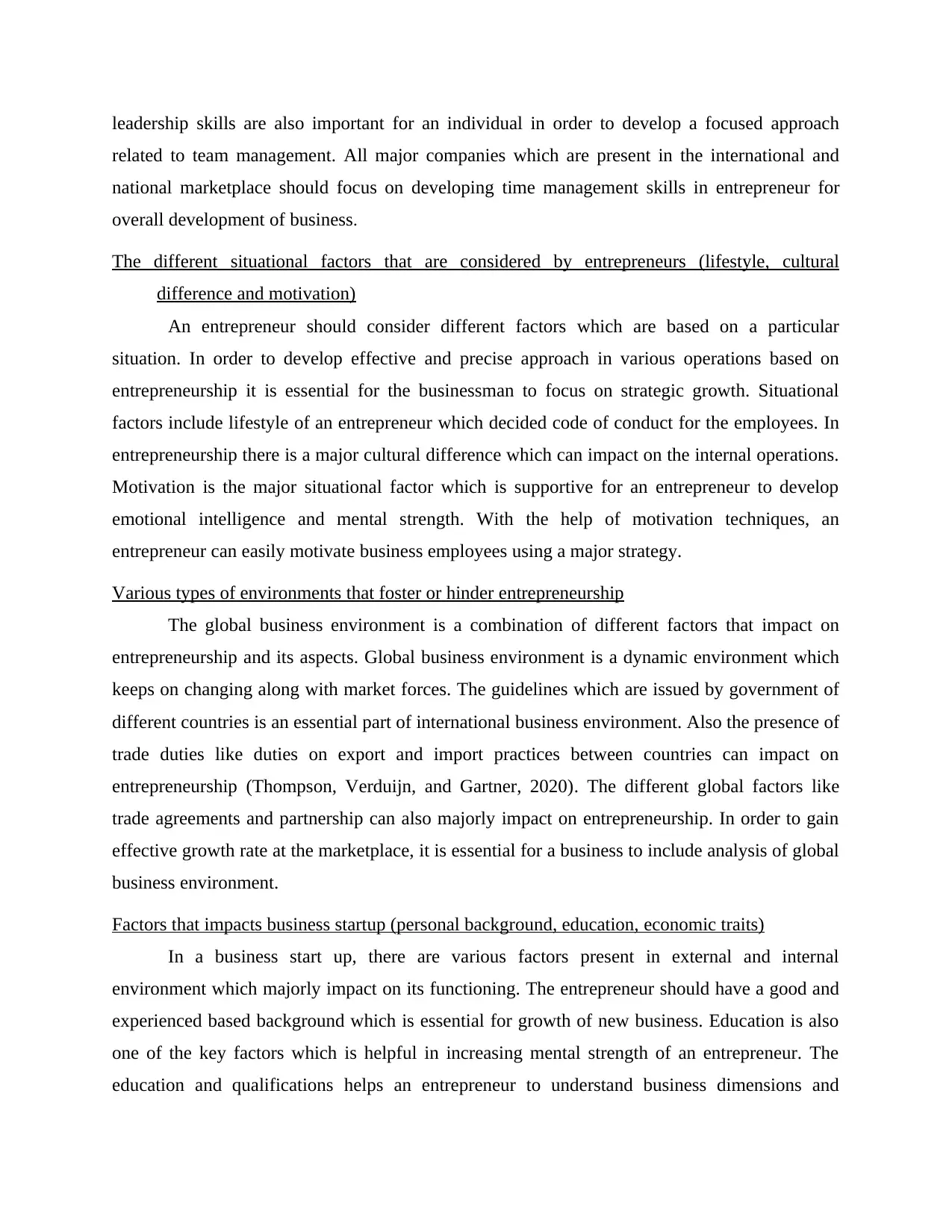
leadership skills are also important for an individual in order to develop a focused approach
related to team management. All major companies which are present in the international and
national marketplace should focus on developing time management skills in entrepreneur for
overall development of business.
The different situational factors that are considered by entrepreneurs (lifestyle, cultural
difference and motivation)
An entrepreneur should consider different factors which are based on a particular
situation. In order to develop effective and precise approach in various operations based on
entrepreneurship it is essential for the businessman to focus on strategic growth. Situational
factors include lifestyle of an entrepreneur which decided code of conduct for the employees. In
entrepreneurship there is a major cultural difference which can impact on the internal operations.
Motivation is the major situational factor which is supportive for an entrepreneur to develop
emotional intelligence and mental strength. With the help of motivation techniques, an
entrepreneur can easily motivate business employees using a major strategy.
Various types of environments that foster or hinder entrepreneurship
The global business environment is a combination of different factors that impact on
entrepreneurship and its aspects. Global business environment is a dynamic environment which
keeps on changing along with market forces. The guidelines which are issued by government of
different countries is an essential part of international business environment. Also the presence of
trade duties like duties on export and import practices between countries can impact on
entrepreneurship (Thompson, Verduijn, and Gartner, 2020). The different global factors like
trade agreements and partnership can also majorly impact on entrepreneurship. In order to gain
effective growth rate at the marketplace, it is essential for a business to include analysis of global
business environment.
Factors that impacts business startup (personal background, education, economic traits)
In a business start up, there are various factors present in external and internal
environment which majorly impact on its functioning. The entrepreneur should have a good and
experienced based background which is essential for growth of new business. Education is also
one of the key factors which is helpful in increasing mental strength of an entrepreneur. The
education and qualifications helps an entrepreneur to understand business dimensions and
related to team management. All major companies which are present in the international and
national marketplace should focus on developing time management skills in entrepreneur for
overall development of business.
The different situational factors that are considered by entrepreneurs (lifestyle, cultural
difference and motivation)
An entrepreneur should consider different factors which are based on a particular
situation. In order to develop effective and precise approach in various operations based on
entrepreneurship it is essential for the businessman to focus on strategic growth. Situational
factors include lifestyle of an entrepreneur which decided code of conduct for the employees. In
entrepreneurship there is a major cultural difference which can impact on the internal operations.
Motivation is the major situational factor which is supportive for an entrepreneur to develop
emotional intelligence and mental strength. With the help of motivation techniques, an
entrepreneur can easily motivate business employees using a major strategy.
Various types of environments that foster or hinder entrepreneurship
The global business environment is a combination of different factors that impact on
entrepreneurship and its aspects. Global business environment is a dynamic environment which
keeps on changing along with market forces. The guidelines which are issued by government of
different countries is an essential part of international business environment. Also the presence of
trade duties like duties on export and import practices between countries can impact on
entrepreneurship (Thompson, Verduijn, and Gartner, 2020). The different global factors like
trade agreements and partnership can also majorly impact on entrepreneurship. In order to gain
effective growth rate at the marketplace, it is essential for a business to include analysis of global
business environment.
Factors that impacts business startup (personal background, education, economic traits)
In a business start up, there are various factors present in external and internal
environment which majorly impact on its functioning. The entrepreneur should have a good and
experienced based background which is essential for growth of new business. Education is also
one of the key factors which is helpful in increasing mental strength of an entrepreneur. The
education and qualifications helps an entrepreneur to understand business dimensions and
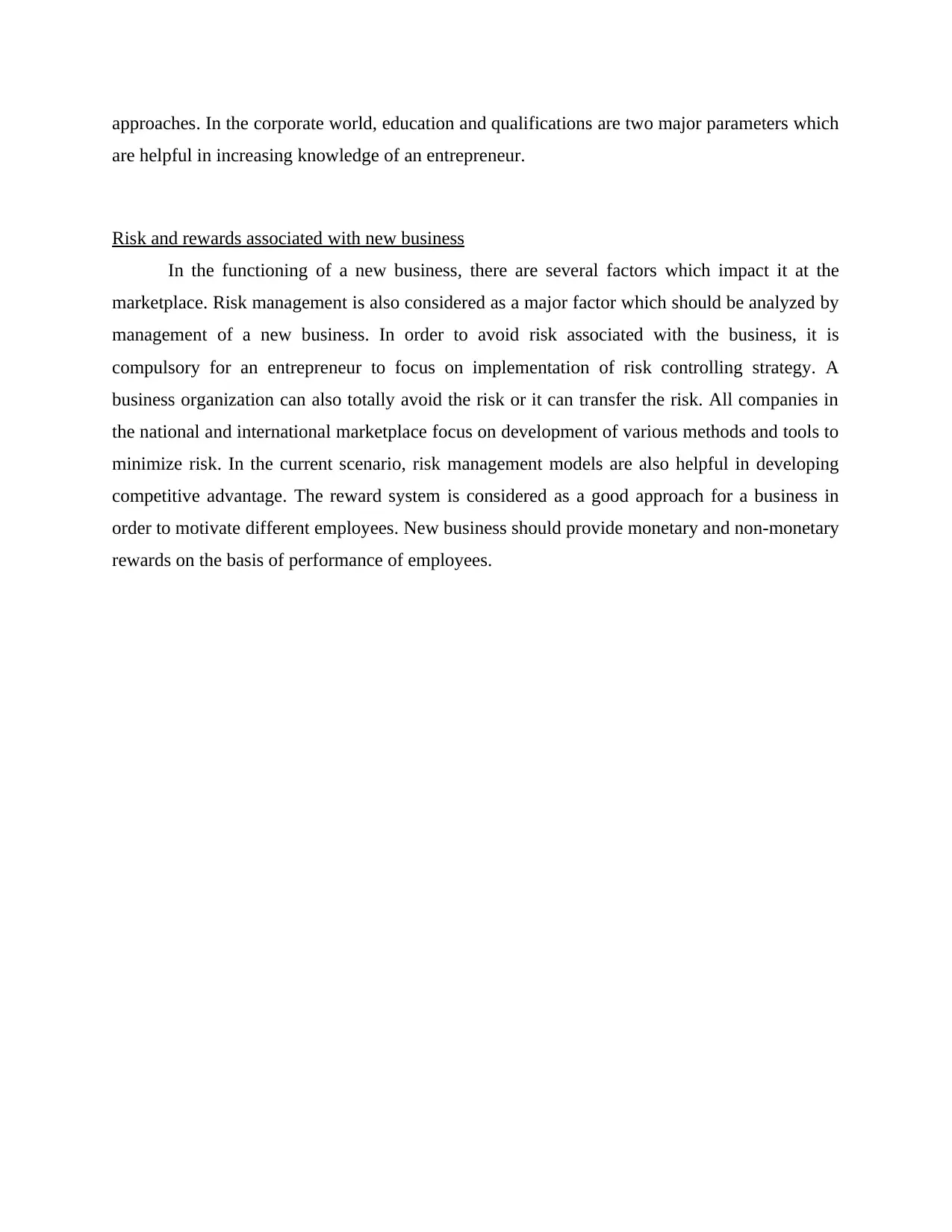
approaches. In the corporate world, education and qualifications are two major parameters which
are helpful in increasing knowledge of an entrepreneur.
Risk and rewards associated with new business
In the functioning of a new business, there are several factors which impact it at the
marketplace. Risk management is also considered as a major factor which should be analyzed by
management of a new business. In order to avoid risk associated with the business, it is
compulsory for an entrepreneur to focus on implementation of risk controlling strategy. A
business organization can also totally avoid the risk or it can transfer the risk. All companies in
the national and international marketplace focus on development of various methods and tools to
minimize risk. In the current scenario, risk management models are also helpful in developing
competitive advantage. The reward system is considered as a good approach for a business in
order to motivate different employees. New business should provide monetary and non-monetary
rewards on the basis of performance of employees.
are helpful in increasing knowledge of an entrepreneur.
Risk and rewards associated with new business
In the functioning of a new business, there are several factors which impact it at the
marketplace. Risk management is also considered as a major factor which should be analyzed by
management of a new business. In order to avoid risk associated with the business, it is
compulsory for an entrepreneur to focus on implementation of risk controlling strategy. A
business organization can also totally avoid the risk or it can transfer the risk. All companies in
the national and international marketplace focus on development of various methods and tools to
minimize risk. In the current scenario, risk management models are also helpful in developing
competitive advantage. The reward system is considered as a good approach for a business in
order to motivate different employees. New business should provide monetary and non-monetary
rewards on the basis of performance of employees.
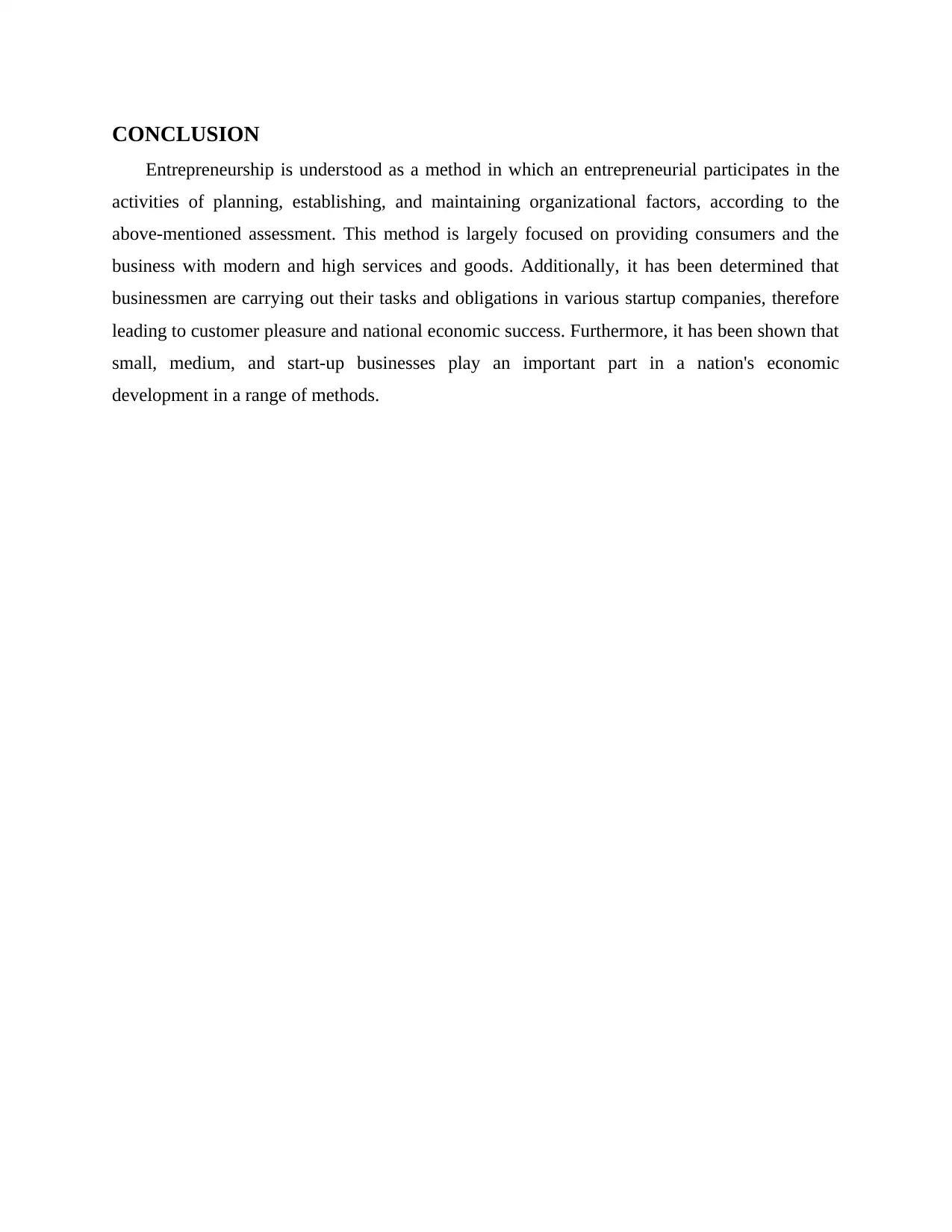
CONCLUSION
Entrepreneurship is understood as a method in which an entrepreneurial participates in the
activities of planning, establishing, and maintaining organizational factors, according to the
above-mentioned assessment. This method is largely focused on providing consumers and the
business with modern and high services and goods. Additionally, it has been determined that
businessmen are carrying out their tasks and obligations in various startup companies, therefore
leading to customer pleasure and national economic success. Furthermore, it has been shown that
small, medium, and start-up businesses play an important part in a nation's economic
development in a range of methods.
Entrepreneurship is understood as a method in which an entrepreneurial participates in the
activities of planning, establishing, and maintaining organizational factors, according to the
above-mentioned assessment. This method is largely focused on providing consumers and the
business with modern and high services and goods. Additionally, it has been determined that
businessmen are carrying out their tasks and obligations in various startup companies, therefore
leading to customer pleasure and national economic success. Furthermore, it has been shown that
small, medium, and start-up businesses play an important part in a nation's economic
development in a range of methods.
Secure Best Marks with AI Grader
Need help grading? Try our AI Grader for instant feedback on your assignments.
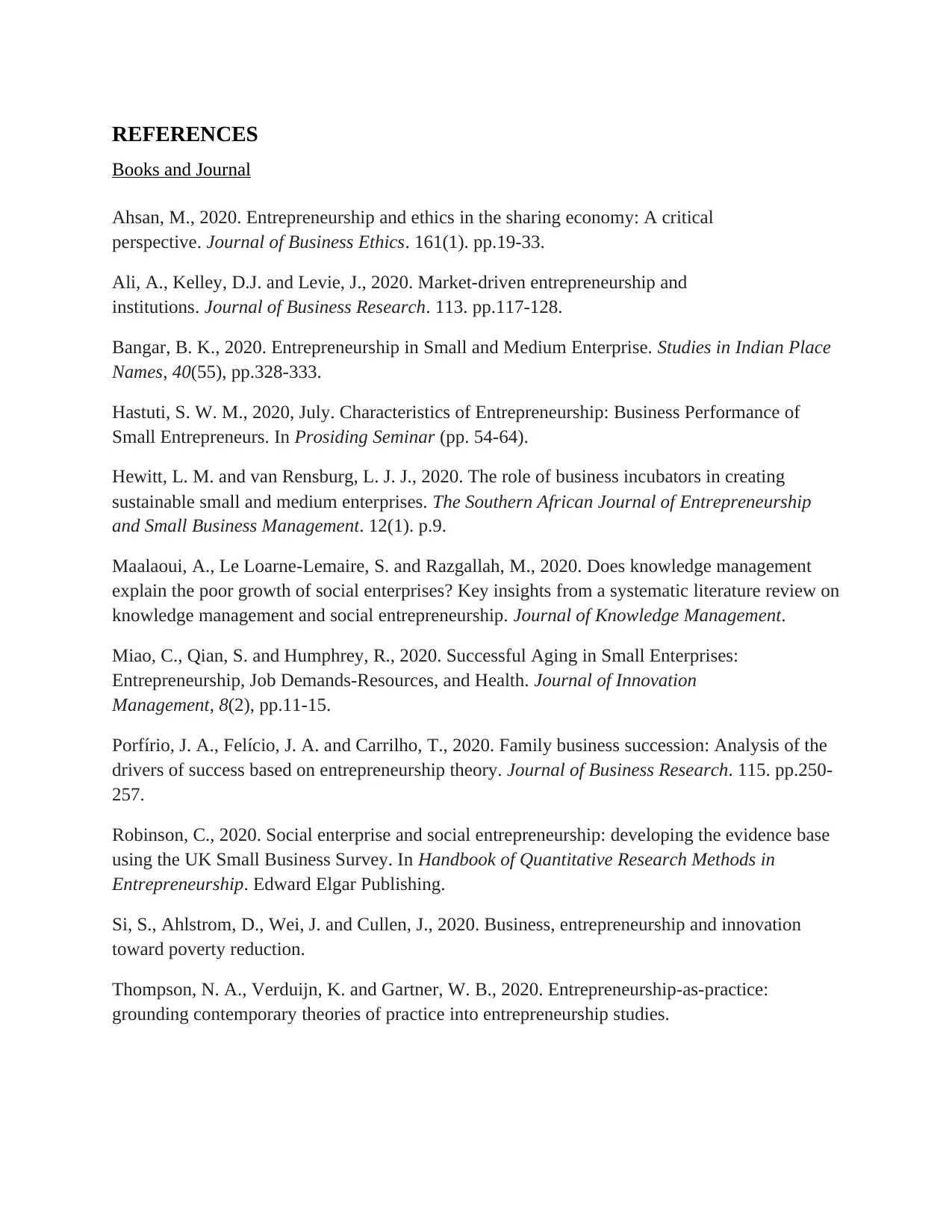
REFERENCES
Books and Journal
Ahsan, M., 2020. Entrepreneurship and ethics in the sharing economy: A critical
perspective. Journal of Business Ethics. 161(1). pp.19-33.
Ali, A., Kelley, D.J. and Levie, J., 2020. Market-driven entrepreneurship and
institutions. Journal of Business Research. 113. pp.117-128.
Bangar, B. K., 2020. Entrepreneurship in Small and Medium Enterprise. Studies in Indian Place
Names, 40(55), pp.328-333.
Hastuti, S. W. M., 2020, July. Characteristics of Entrepreneurship: Business Performance of
Small Entrepreneurs. In Prosiding Seminar (pp. 54-64).
Hewitt, L. M. and van Rensburg, L. J. J., 2020. The role of business incubators in creating
sustainable small and medium enterprises. The Southern African Journal of Entrepreneurship
and Small Business Management. 12(1). p.9.
Maalaoui, A., Le Loarne-Lemaire, S. and Razgallah, M., 2020. Does knowledge management
explain the poor growth of social enterprises? Key insights from a systematic literature review on
knowledge management and social entrepreneurship. Journal of Knowledge Management.
Miao, C., Qian, S. and Humphrey, R., 2020. Successful Aging in Small Enterprises:
Entrepreneurship, Job Demands-Resources, and Health. Journal of Innovation
Management, 8(2), pp.11-15.
Porfírio, J. A., Felício, J. A. and Carrilho, T., 2020. Family business succession: Analysis of the
drivers of success based on entrepreneurship theory. Journal of Business Research. 115. pp.250-
257.
Robinson, C., 2020. Social enterprise and social entrepreneurship: developing the evidence base
using the UK Small Business Survey. In Handbook of Quantitative Research Methods in
Entrepreneurship. Edward Elgar Publishing.
Si, S., Ahlstrom, D., Wei, J. and Cullen, J., 2020. Business, entrepreneurship and innovation
toward poverty reduction.
Thompson, N. A., Verduijn, K. and Gartner, W. B., 2020. Entrepreneurship-as-practice:
grounding contemporary theories of practice into entrepreneurship studies.
Books and Journal
Ahsan, M., 2020. Entrepreneurship and ethics in the sharing economy: A critical
perspective. Journal of Business Ethics. 161(1). pp.19-33.
Ali, A., Kelley, D.J. and Levie, J., 2020. Market-driven entrepreneurship and
institutions. Journal of Business Research. 113. pp.117-128.
Bangar, B. K., 2020. Entrepreneurship in Small and Medium Enterprise. Studies in Indian Place
Names, 40(55), pp.328-333.
Hastuti, S. W. M., 2020, July. Characteristics of Entrepreneurship: Business Performance of
Small Entrepreneurs. In Prosiding Seminar (pp. 54-64).
Hewitt, L. M. and van Rensburg, L. J. J., 2020. The role of business incubators in creating
sustainable small and medium enterprises. The Southern African Journal of Entrepreneurship
and Small Business Management. 12(1). p.9.
Maalaoui, A., Le Loarne-Lemaire, S. and Razgallah, M., 2020. Does knowledge management
explain the poor growth of social enterprises? Key insights from a systematic literature review on
knowledge management and social entrepreneurship. Journal of Knowledge Management.
Miao, C., Qian, S. and Humphrey, R., 2020. Successful Aging in Small Enterprises:
Entrepreneurship, Job Demands-Resources, and Health. Journal of Innovation
Management, 8(2), pp.11-15.
Porfírio, J. A., Felício, J. A. and Carrilho, T., 2020. Family business succession: Analysis of the
drivers of success based on entrepreneurship theory. Journal of Business Research. 115. pp.250-
257.
Robinson, C., 2020. Social enterprise and social entrepreneurship: developing the evidence base
using the UK Small Business Survey. In Handbook of Quantitative Research Methods in
Entrepreneurship. Edward Elgar Publishing.
Si, S., Ahlstrom, D., Wei, J. and Cullen, J., 2020. Business, entrepreneurship and innovation
toward poverty reduction.
Thompson, N. A., Verduijn, K. and Gartner, W. B., 2020. Entrepreneurship-as-practice:
grounding contemporary theories of practice into entrepreneurship studies.
1 out of 17
Related Documents
Your All-in-One AI-Powered Toolkit for Academic Success.
+13062052269
info@desklib.com
Available 24*7 on WhatsApp / Email
![[object Object]](/_next/static/media/star-bottom.7253800d.svg)
Unlock your academic potential
© 2024 | Zucol Services PVT LTD | All rights reserved.





